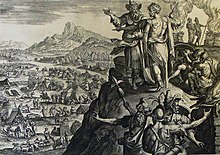| Balak | |
|---|---|
 Black (wearing a crown) with Balaam | |
| In-universe information | |
| Title | King of Moab |
| Family | Zippor (father) |
| Relatives | Eglon (grandson) |
| Religion | Chemosh |
| Nationality | Moab |
| Birth place | Kingdom of Moab |
| Death place | Kingdom of Moab |
Balak son of Zippor (Hebrew: בָּלָק Bālāq)[1] was a king of Moab described in the Book of Numbers in the Hebrew Bible, where his dealings with the prophet and sorcerer Balaam are recounted. Balak tried to engage Balaam the son of Beor for the purpose of cursing the migrating Israelite community.[2] On his journey to meet the princes of Moab, Balaam is stopped by an angel of the Lord after beating his female donkey. The Lord then "opened the mouth of the donkey" to tell him there was an angel with a drawn sword facing him. He tells the angel he will return home: "I have sinned, for I did not know that you stood against me on the road". The angel instructs Balaam to attend the meeting with the princes of Moab but to "say only what I tell you".[3] According to Numbers 22:2, and Joshua 24:9, Balak was the son of Zippor.
In the preceding chapter of Numbers,[4] the Israelites, seeking the Promised Land following their Exodus from Egypt, had defeated the Canaanites at a place named Hormah, as well as the Amorites and the people of Bashan, and next approached Moab. The biblical narrative stresses the fears of the people of Moab, who were 'exceedingly afraid' and 'sick with dread' (NKJV) or 'terrified' (GNT).[5] Their fears appear to relate to the size of the Israelite population and the consequent resource depletion which could be expected if they were permitted to occupy Moabite land.
Balak initially conferred with his Midianite allies[6] in order to block Israelite settlement, before sending his elders (along with Midianite elders) to seek Balaam's curse on them. The Midianites appear to have been co-located with the Moabites - according to the Targum of Jonathan, they were one alliance of people at this time[7] and therefore had a common interest in preventing Israelite settlement of the area.
After his mission with Balaam to curse Israelites failed, Balak decided to ally with Midianites to gather their women in order to lead Israelites men astray in adultery.
Sources detailing the story of Balak:
- Numbers 22–24
- Judges 11:25 - This is the only time in the Bible that Balak is not mentioned in direct conjunction with Balaam.
- Micah 6:5
According to the Pulpit Commentary, Balak seems to be mentioned by name on a papyrus in the British Museum;[8] Gardiner and Caminos, however, transcribe and translate this name as Baꜥalry.[9][10] In 2019, Israel Finkelstein, Nadav Na'aman and Thomas Römer proposed the common reading of "House of David" in the Mesha Stele is actually "Balak".
- ^ McKenzie, John L. (1965). Dictionary of the Bible (1995 First Touchstone ed.). New York: Simon & Schuster. p. 77. ISBN 0-684-81913-9.
- ^ Num 22:1–22:5
- ^ Num 22:21–22:35
- ^ Numbers 21
- ^ Num 22:3
- ^ Num 22:4
- ^ Gill's Exposition of the Bible http://biblehub.com/numbers/22-4.htm accessed 24 June 2015
- ^ "Numbers 22 Pulpit Commentary". biblehub.com. Retrieved 21 June 2015.
- ^ Gardiner, A.H. (1937). Late-Egyptian Miscellanies. Bibliotheca Aegyptiaca. Édition de la Fondation égyptologique Reine Élisabeth. p. 31. Retrieved 2024-02-10.
- ^ Caminos, R.A. (1954). Late-Egyptian Miscellanies. Brown Egyptological studies. Oxford University Press. p. 108. ISBN 978-0-318-79978-0. Retrieved 2024-02-10.